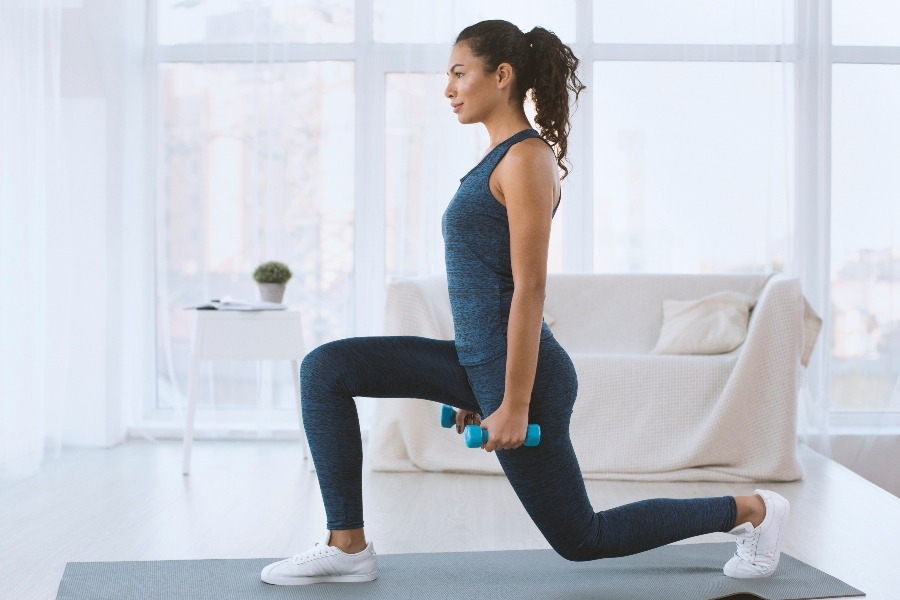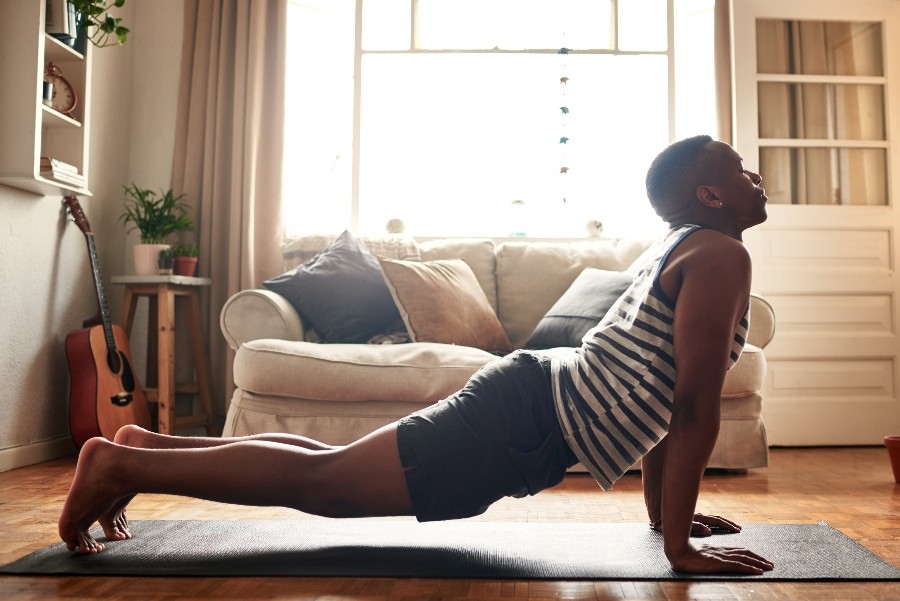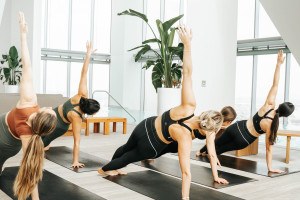Here’s Why Many of Us Are Exercising a Whole Lot More Right Now
A look into why our bodies and minds might crave movement amid a global pandemic, with insight from local mental health experts.

Does the coronavirus pandemic have you exercising a whole lot more than usual? Here are nine reasons why, according to local mental health pros. / Photograph courtesy of Getty Images.
For some time now, many of us been spending a whole lot more time indoors. Our sense of normalcy has totally changed. There’s been a lot of fear and pain and uncertainty — people have lost loved ones, shuttered their businesses, or been laid off from their jobs. Essential workers risk their lives every day. Some of us are suffering from anxiety, and having trouble sleeping. Many of us have tried to regain a sense of routine and community by pursuing simple hobbies like gardening or baking bread, FaceTime-ing friends and family and ordering restaurant meals when we can afford it via curbside pick-ups or contactless deliveries.
One other coping mechanism many of us seem to be pursuing right now, at least among my friends, family, and Twitter pals? Exercising. I guess it’s no surprise, as many fitness studios are offering live-streamed and on-demand workouts you can do right in your own home. Heck, some have even turned living areas into makeshift gyms.
To help figure out why some people are working out more right now — and what the benefits are — we turned to five local mental health pros specializing in sport and exercise science. Here’s what they had to say.
We’re all really freakin’ anxious.
It’s no secret that the coronavirus pandemic has brought on feelings of distress, fear, and uncertainty for many folks. And anxiety, according to Edward Darrah, founder of Darrah Counseling and mental health and performance counselor for Temple Athletics, can make us react in different ways. “We often associate anxiety with detrimental symptoms such as restlessness, muscle tension, and irritability,” he says, “but it’s also linked to several positive attributes, such as enhanced energy and motivation.” Since the onset of the pandemic, Darrah and other mental health professionals have witnessed individuals using exercise to cope with and manage their corona anxiety, and channeling that boost in energy in healthy outlets, including fitness.
Working out is a natural mood-booster…
When we’re stressed, our bodies and minds alike crave comfort, which movement of any kind can provide. According to Sean Cleary, licensed counselor and founder of Cleary Counseling Services, a rigorous workout routine produces endorphins, serotonin, dopamine, and other important neurotransmitters that increase our mood both immediately after the workout and over time. Dopamine, he says, is a key player in the reward center of our brain, “flooding our brain during a workout, and making the exercise more enjoyable and us more likely to exercise again and again.”
Mitchell Greene, licensed clinical and sport psychologist and owner of Greenepsych, says the desire to get moving can be considered a therapeutic coping mechanism, especially since exercising can serve as a healthy release from anxiety. (Hello, endorphins!) He reminds us that consistent exercise can lead to lasting changes in brain chemistry that mimic the effects of antidepressants. “You don’t just feel good when you work out, you literally are good.”
…and helps fight off infection.
Plus, taking your fitness *safely* outdoors raises our O2 intake, which metabolizes fat and carbs, fuels our muscles, and keeps our cardiovascular system healthy, according to Lois A. Butcher-Poffley, assistant professor of Kinesiology at Temple University’s College of Public Health. On top of all that, increased O2 makes us more alert and more productive because it helps to eliminate toxins and bad bacteria from the body.
Exercise can provide a sense of freedom…
With stay-at-home orders in place (and no true sense of when we’ll be able to “break free” exactly), we might be feeling restricted or severely cooped up. For many, exercise is a reason to get out of a stuffy house, says Butcher-Poffley. “If you’re developing a serious case of cabin fever, you want out,” she says. “So, you run in your neighborhood, take a walk in the park, or find a fitness trail. Fresh air, different scenery, and feeling the earth under your feet can make you feel renewed.”
…as well as structure to our daily routine.
Being at home has likely flipped your daily routine on its head. While replicating your pre-COVID schedule isn’t totally possible, many are using fitness as a kind of anchor for their schedule. According to Joel Fish, licensed psychologist and director of the Center for Sport Psychology, “Everyone seems to agree on the importance of trying to establish a daily routine, structure, and predictability [at this time]. For example, scheduling an online fitness class at 9 a.m. two or three times per week can serve as a starting point for your day.” Plus, if you have kids, exercise is a great way to break up or end the school day, and bond as a family.
And remember those New Year’s resolutions of yours? Darrah encourages you to revisit or (re)establish your 2020 health goals, if you have the flexibility and ability to do so.

Photograph courtesy of Getty Images.
We want to feel in control of something…
…especially when so little feels in our control right now. As people’s pandemic patience runs thin, Fish believes folks are turning to exercise partly because it provides us something to take charge of, make decisions about, and work towards. “In terms of goal-setting, we can set tangible goals for improvement when it comes to fitness, exercise, and recreation,” he says. “In these uncertain times, where it is often hard to feel a sense of accomplishment, being able to attain short-term goals — achieving a new running milestone, strength training PR, or yoga pose — feels really good.”
Additionally, a desire for control goes hand-in-hand with anxiety and structure-building. We are all unsure of what the future will bring, which can cause unease and feelings of helplessness. In order to cope, Clearly says some folks are choosing to exercise whenever they can in order to bring some normalcy back into our daily schedule.
…and feel connected to others…
Folks, video calls aren’t the only way to socialize right now (and hey, Zoom fatigue is apparently a thing now). Whether it’s live-streamed or on-demand, an online workout can make you feel part of a community and connected to non-housemates. According to Cleary, working out in a group “increases competition amongst members and allows members to feel a sense of accomplishment when they succeed in front of others.”
…and are sometimes just bored.
Staying at home gets old fast. Depending on your current work/sleep/general life schedule, you might have some extra time in the mornings due to a reduced or nonexistent commute, or in the evenings since you literally don’t have anywhere to be. And while vegging out on your couch is totally okay, some of us naturally experience productivity guilt and feel like we *need* to be doing something. (Heads up: you don’t.) But if you’re feeling bored, moving your body is a healthy way to pass the time. Butcher-Poffley reminds us that movement is a way to expend active and resting energy, energy that can make us antsy or sluggish when not released.
Plus, if you have internet access, fitness classes can be more accessible right now.
The ability to access virtual workouts, especially ones that are free, has made fitness more accessible to a wider community than usual. (Unfortunately, for those who have limited computer or internet access, that is not the case.) Whether you’re a newbie or seasoned athlete, Greene believes the abundance of at-home workouts has allowed more people to try out exercises they may have never considered before due to preference or cost. We agree it’s super enticing — sometimes we’ve got four different workouts we want to try in a single day (which we logistically could do since we don’t have to commute anywhere, but over-exercising isn’t good for you!). Regardless, there’s a bunch of ways to move right now, so it’s worth taking advantage of the opportunity if you are able to.
Want to hear more from us? Join Be Well Philly at:
FACEBOOK | INSTAGRAM | NEWSLETTER | TWITTER


